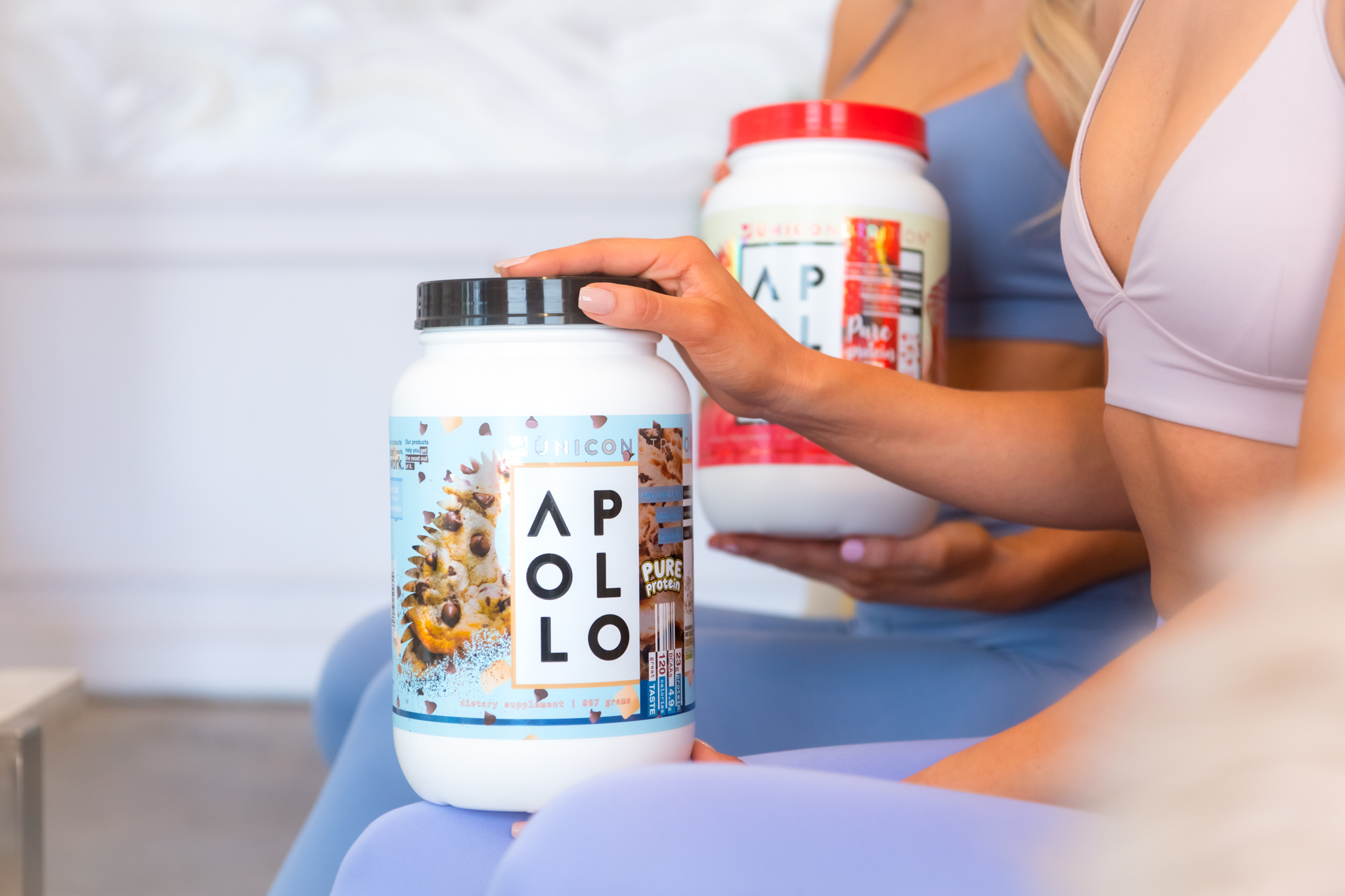Protein powders are very popular among the health and fitness community, because they are a great way to add more protein to your diet.
Today we’re going to compare the two most popular ways of making supplementary protein- protein isolate vs protein concentrate, to help you decide which is best for you and your goals.

Protein, Protein, and More Protein!
With so many different types of protein powders on the market, it can be hard to decide which one to choose.
Not only are there TONS of different types of protein supplements to choose from between bars, powders, ready-to-drink shakes, (and heck I’ve even seen protein popcorn), etc…
But these high-protein products all contain a variety of different types of protein.
One of the most popular types of protein used in supplements is whey protein.
There are two commonly used types of whey protein: isolate and concentrate.
Both of forms provide many benefits for the body.
It’s important to know that almost every different type of protein can be manufactured as either an isolate of concentrate.
But for the purposes of this article, we’ll use whey protein to showcase the key differences between protein isolates and concentrates.
Each type has its pros and cons, so keep reading to find out which kind is best for you and your goals.
Right This Whey, Please
Before we dig into the discussion on whey protein isolate vs concentrate, let’s start with a brief refresher on whey.
Whey protein, used in many supplements, comes from cow’s milk.
This common protein source makes up about 20% of the protein in cow’s milk.
The other 80% consists of a protein called casein protein.
Whey is the liquid part of cow’s milk that is leftover during the process of making cheese and yogurt.
This liquid has quick-digesting proteins that are referred to as whey protein.1
If you’ve ever noticed the liquid floating on top of your yogurt when you take it out of the fridge, that’s whey protein!
Pro tip: Don’t dump out the liquid on the top of your yogurt – that’s quality protein! Stir it in, so you make sure you get all the protein.
Due to whey’s quick-digesting nature, whey is considered one of the best proteins for building muscle.2
Whey isolate and whey concentrate are the most common forms of whey found in supplements.
Isolate and concentrate are produced through different processing methods, and they have a slightly different nutritional makeup.
How Whey Protein Isolate is Made
The differences between whey isolate and whey concentrates lies in the way they are processed, or made.
So to continue with our whey protein example, let’s take you out to the farm.
Imagine your local dairy farmer, (let’s call him Farmer Tom), setting out to make his favorite sharp cheddar cheese.
He uses various cultures, or acids to start the process of turning his milk into cheese.
He then heats the resulting solidified rennet so that he can separate his cheese curds from the liquid-y protein.
(As you might have guessed, that liquid-y protein is going to become our valuable whey protein!)
After the liquid whey is collected, it is processed further to boost its protein content.
It is then dried to form a powder called whey isolate that contains about 80% protein.
Some processing can produce a product that contains up to 90% protein by weight.
The other 10-20% that remains after processing is whey concentrate.
Recommended Reading: This is how whey protein powder has been made for years, but now their are new, more sustainable ways of making ‘whey’, which we discuss in our article about protein that is made sustainably using fermentation, instead of dairy cows!
The Difference Between Isolates and Concentrates
Whey concentrate contains carbohydrates and fats alongside protein.1
Both whey isolates and whey concentrates are identical when it comes to their amino acid makeup.
They are both derived from the same complete protein, so they are both a source of all essential amino acids.
- A 100-calorie serving of whey isolate contains 23 grams of protein, 1 gram of carbohydrate, and zero grams of fat.
- A 100-calorie serving of whey concentrate contains 18 grams of protein, 3.5 grams of carbohydrate, and 1.5 grams of fat.
| Whey Protein Isolate (WPI) | Whey Protein Concentrate (WPC) | |
| Calories | 100 | 100 |
| Protein | 23 | 18 |
| Carbohydrates | 1 | 3.5 |
| Fats | 0 | 1.5 |
Along with being lower in carbohydrate and fat, whey isolate also contains less lactose than whey concentrate.
If you are sensitive to lactose, choosing a whey isolate can be easier on your stomach.
That being said, the amount of lactose in both isolates and concentrates is fairly low, so most of the time they can both be tolerated well in those with lactose sensitivity.3
The key difference between whey isolate and whey concentrate is that whey (or any other protein) isolate goes through more processing, providing a higher protein content with less fat and carbohydrate.
Whey Protein Concentrate vs. Isolate
So now you understand the difference between both types of protein…
But how do you choose which one is healthier for you?
There is a ton of research that shows using any type of whey, or other types of protein powder can be beneficial in people who are active.4
A study that examined two groups of active people taking either isolate or concentrated forms of protein powder both produced a substantial increase in lean body mass (fat free muscle) and strength.5
Therefore, there isn’t a ton of enough evidence to support that one form of protein is necessarily better than the other…
After all, whey protein isolate and whey protein concentrate are both complete proteins – meaning they contain all of the essential amino acids your body can’t produce on its own.
The amino acid profiles of whey isolate and concentrate are virtually identical, so both kinds can support your muscles and body equally as well.
That being said, the macronutrient profile of the isolated and concentrated forms of a protein are slightly different.
TIP: Those following a low-carb or low-fat diet should opt for the isolated versions of a protein supplement, as the isolated proteins have fewer fats and carbs.
Isolated proteins are usually the better proteins for losing weight for this same reason.
Protein Intake and Exercise – What’s Important?
When it comes to achieving your fitness goals, overall daily protein intake is most important.
If you’re looking to build muscle or lose weight, getting enough protein in your diet is necessary.
Recommended Reading: Learn more about how much protein you need per day.
For best results, it’s recommended that your dietary protein come from high-quality, complete protein sources such as eggs, dairy, and poultry.
If you’re vegetarian or vegan, it’s important to choose complementary plant-based sources of protein that together provide a complete protein, so you get all the essential amino acids required for building muscle.
You should space your protein intake throughout the day and after workouts.
Ideally, you want to aim to get most of your protein from food sources in your diet, but protein supplements can be a great way to get that extra 15-25 grams of protein you might be lacking.
Whey protein — whether in the form of isolate, concentrate, or a combination of the two — is a high-quality, complete protein that can help you reach your daily protein needs.
Some protein powders contain a blend of different protein sources.
Protein blends tend to be the most beneficial in terms of building muscle.
A protein powder with a quick digesting protein (whey), medium digesting (casein), and slow-digesting protein (egg) will keep your cells fueled with a steady stream of protein for up to 9 hours.
You can still supplement with protein powder even if you’re vegan.
There are plenty of quality protein supplements featuring plant-based sources of protein available.
How Much Protein Do You Need?
Just like calorie needs, protein needs vary from person to person.
Specific needs depend on age, gender, activity level, and goals.
In general, if you’re trying to gain muscle and change your body composition, you should be eating at least 1.2 gram of protein per kilogram of your body weight.
Some experts recommend up to 2 grams per kilogram depending on level of activity.6
For example, a person who weighs 140 lbs would divide that by 2.2 kg, and multiply by 1.2 – 2 grams of protein.
So a person who weighs 140 lbs needs at least 76 grams of protein per day.
If you’re not sure how much protein you need to support your body and your goals, consult a registered dietitian for help.
Summary
Your protein intake is a very important piece of the puzzle when it comes to building muscle and reaching your fitness goals.
Most protein supplements contain whey protein, a protein sourced from cow’s milk.
There are different types of whey protein, including isolate and concentrate.
The main difference when comparing whey protein isolate vs whey concentrate is how they are processed.
Whey isolate undergoes more processing than concentrate, giving it a higher protein content with fewer carbs and fat.
Both whey isolate and whey concentrate are complete sources of protein that give you all of the essential amino acids you need to build muscle.
If you’ve been busy working on your fitness, you can be certain that a protein powder with a blend that includes both whey isolate and whey concentrate will help support your fitness goals.
Whether your goal is to lose weight, build muscle, or maintain your current body, a protein shake can work for you!
Sources
1https://dairyprocessinghandbook.tetrapak.com/chapter/whey-processing
2https://pubmed.ncbi.nlm.nih.gov/25169440/
3https://www.ncbi.nlm.nih.gov/books/NBK44624/#ch3.s20
4https://jissn.biomedcentral.com/articles/10.1186/s12970-017-0177-8
5https://pubmed.ncbi.nlm.nih.gov/26403469/
Recommended Reading:
- The Best Liquids to Mix Your Protein Powder Into - January 31, 2023
- What is a Caloric Surplus? Plus, Why Your Diet Isn’t Working.. - October 17, 2022
- How Much Protein Do I Need Per Day? A Dietitian’s POV - July 26, 2022
